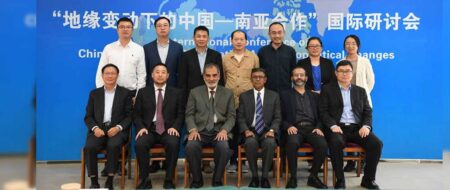‘Solidarity Solar Actions for Energy Transition’
Pakistan’s green policies show commitment to SDGs and energy transition: Mirza Hamid Hassan
Pakistan has validated the sincerity of its international commitments regarding green energy by implementing relevant policies to support the UN’s Sustainable Development Goals and energy transition.
This was stated by Mirza Hamid Hassan, former federal secretary, Water and Power, and member IPS-National Academic Council, while representing the Institute at a webinar, titled ‘Solidarity Solar Actions for Energy Transition’, held on March 21, 2023.
The webinar was co-hosted by China Energy Network Press and People of Asia for Climate Solutions, a Manila-based NGO working to promote climate action and support the acceleration of energy transition in Asian countries, with a special focus on China.
The online forum was attended by researchers and advocates from the major countries in Southeast Asia and South Asia and solar industry leaders from China to review the common challenges, explore shared opportunities, and shape action plans in solidarity to support fast and just energy transitions in Southeast Asia and South Asia.
While talking about the importance and need for solar power in the energy transition, Mirza Hamid highlighted the severe shortage of electric power and indigenous natural gas, which have traditionally been Pakistan’s two major sources of energy, for the last few years. In addition to this, the introduction of independent power producers (IPPs), expensive power purchase agreements with IPPs, and power shortages have resulted in multiple problems of availability, affordability, and reliability of power supply.
Resultantly, Pakistan is now enmeshed in massive circular debt amounting to Rs.400 billion, closure or relocation of industrial units, disruption in economic activity and daily lives of people, and unemployment.
This situation necessitates reforms and paradigm shift in the energy sector. The successive governments have undertaken reforms in the power sector by introducing fresh policies. However, more strenuous efforts, strong political commitment to renewable energy, and market incentives for energy transition are needed for affordable, adequate, and clean energy, he recommended.
Mirza Hamid further suggested making effective use of future energy outlook and transition opportunities in the coming years. For instance, there would be many opportunities for the construction of solar and wind power projects for the public as well as private sector clients. Moreover, Chinese companies can help in indigenization by setting up manufacturing plants for solar panels, wind turbines, and allied equipment in the special economic zones, along with providing capacity-building training to Pakistani workers in manufacturing units.











